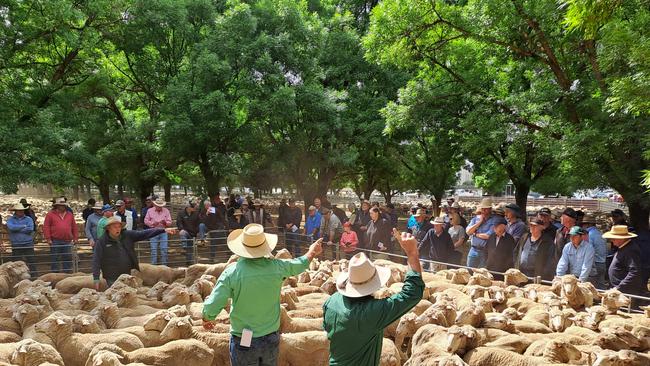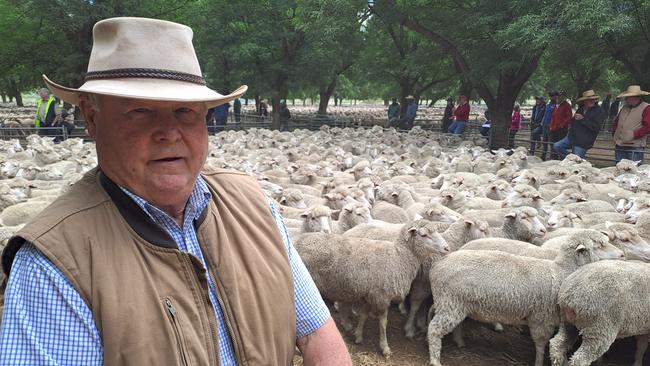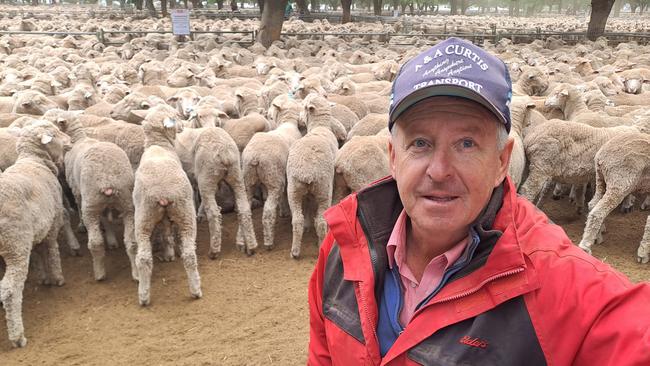Price shocks at Deniliquin sheep sale
All eyes were on the Deniliquin sheep sale today after tough runs at Jerilderie and Hay. Read how the sale went here.
Some light appeared in the dark tunnel of store sheep prices at Deniliquin in the Riverina today.
Merino wether lambs were dearer with recently shorn pens reaching $57 – one auctioneer declaring it the best result recorded this season for the category, which has been hit hard in the market downturn.
Second and third draft runs of Merino ewes also found support and were rated dearer than Jerilderie a week ago as more people competed to buy ewes under $100.
These were the “positives’’ from a sale which again tested auctioneers and there were plenty of agents and onlookers who still rated the sale as looking “cheap enough’’.

The lead ewes showing the most growth and quality arguably looked the best buying on the day, sometimes making only $20 or $40 more than sheep they were almost twice as big as.
The dispersal of the Werrina Merino flock sold to a market top of $166 for a pen of 456 young May/June 2022-drop ewes. All the Werrina sheep were August shorn and Caroonboon blood, dispersed after the Deniliquin based property was recently sold.
The sale opened on a line of first-cross ewes from local property Kapunda; the lead two pens of June/July 2022-ewes all weighed more than 63kg liveweight and sold for $162 and $154.
Originally advertised as a yarding of 22,500, some drafts didn’t arrive and numbers came back to 19,700, taking a little bit of pressure off.
Nutrien auctioneer Marc Braybon said they had worked the phones hard and advertised the sale more widely to try and build enough interest to support the numbers.
Sheep sold to Wagga Wagga, Bendigo, Ballarat, Hamilton, with a reasonable number staying in the local Riverina area.
“There was a few positives,’’ Mr Braybon said.
“Even though people were starting ewes low at where they wanted to buy them ($60 to $80) they pushed on and stuck with the auction and bought sheep.
“There were a lot of blokes who probably came here trying to save dollars who probably ended up spending more than they thought and more than I’ve seen at other sales for those plainer ewes,’’ he said.
There was a noticeable trend at the sale of a low offer price, followed by little follow-up bidding before there would be a burst of activity and the price would gain some momentum.
For example, a pen of 395 young Merino ewes from vendor Abbortsford started at $80 and, after stops and starts in the bidding, sold for $120.
A similar thing was seen for the Brassbutt ewes. The 292 young Merinos started below $100, stalled at $118, and went on to sell at $148.
It happened again with the young Caroonbooon Donne Merino ewes: bidding opened at $80 and after a late burst in bidding, sold for $128.

There were plenty of ewes which sold under $100, and at times there was quite a steep drop off in price between the tops and the second lots. The harshest example of this was in the opening Merino section. After the tops of the Werrina ewes made $166, the adjoining second cut of 208 – all the same description – sold for $76.
It shows how the sale did ebb and flow, and it was probably late in the auction when values showed the most consistency at $70 to $90 on the second to third draft Merino ewes.
Agents said there appeared to be a bigger pool of buyers “comfortable’’ to pay under $100 for young sheep.
Buyers also remained picky on certain issues. There was a line of very well-grown and presented young ewes which were passed in at $106, with the auctioneer putting the sour result down to the sheep not being mulesed.
It was the Merino wether lamb sale which gave auctioneers the most joy after some problematic weeks trying to sell them, including some failed attempts online.
“There hasn’t been Merino wether lambs make that sort of money anywhere in Australia,’’ Elders auctioneer Jason Andrews said.
The lead lines of Gunbar Station Merino wether lambs, shorn in August and showing the potential to grow and carry weight, sold at $57 and $50. The tops of the unshorn wether lambs from Mayfield made $56.
After this, the bulk of the wether lambs went from $20 to $44 depending on size.
Elders Hay agent Peter Head bought 1300 wether lambs for an average of $44, for a Riverina property which has opted to run all dry sheep for ease of management.
He said the lambs would be grown out to two years, with the wool cuts expected to easily account for their cost.

Mr Braybon said the looming grain harvest was starting to lift interest in Merino wether lambs, and he believed their low price would encourage farmers to opt in and run some.
“Everyone is saying grain growers won’t muck around with sheep but at such low money a reasonable number won’t be able to help themselves,’’ he said.
Key results from Deniliquin today:
•Werrina Merino dispersal: 456 ewes, May/June 2022 drop, Aug shorn, Caroonboon blood, $166; 208 at $76; 316 ewes 2021 drop, $132; 255 ewes 2020 drop $110 and $80; 234 ewes 2019 drop $70; 207 Merino ewe lambs unshorn $46
•Kapunda: 180 first-cross ewes, June/July 2022 drop, Sept shorn, Gudair vaccinated, weighed over 63kg liveweight, $162; 180 at $154; 198 at $128
•Waikoloa: 437 Merino ewes, June/July 2022 drop, Alma blood, August shorn, $130
•Brassbutt: 292 Merino ewes, June/July 22 drop and shorn, $148
•Paringavale: 195 Merino ewes, June/July 2022 drop, May shorn, $128
•Abbortsford: 395 Merino ewes, April/May 2022 drop, July shorn, Collinsville blood, $120; 601 at $84; 419 at $74.




